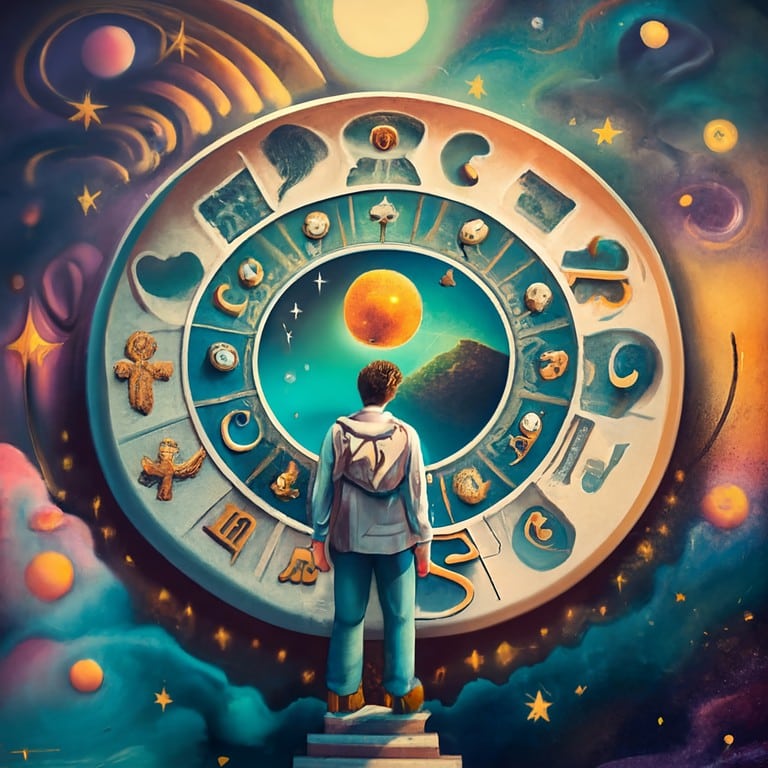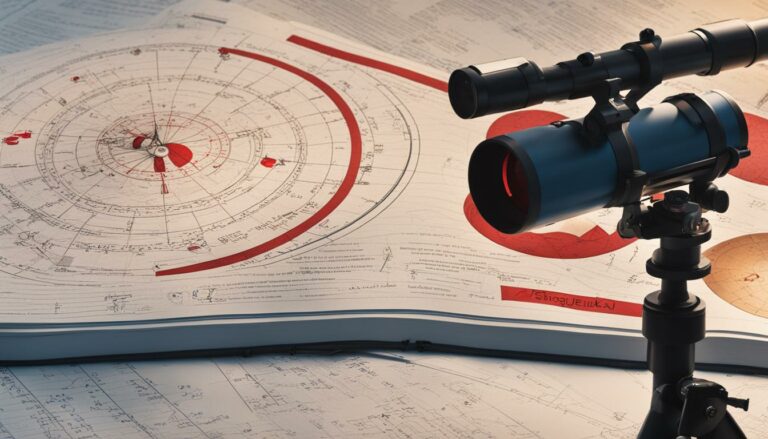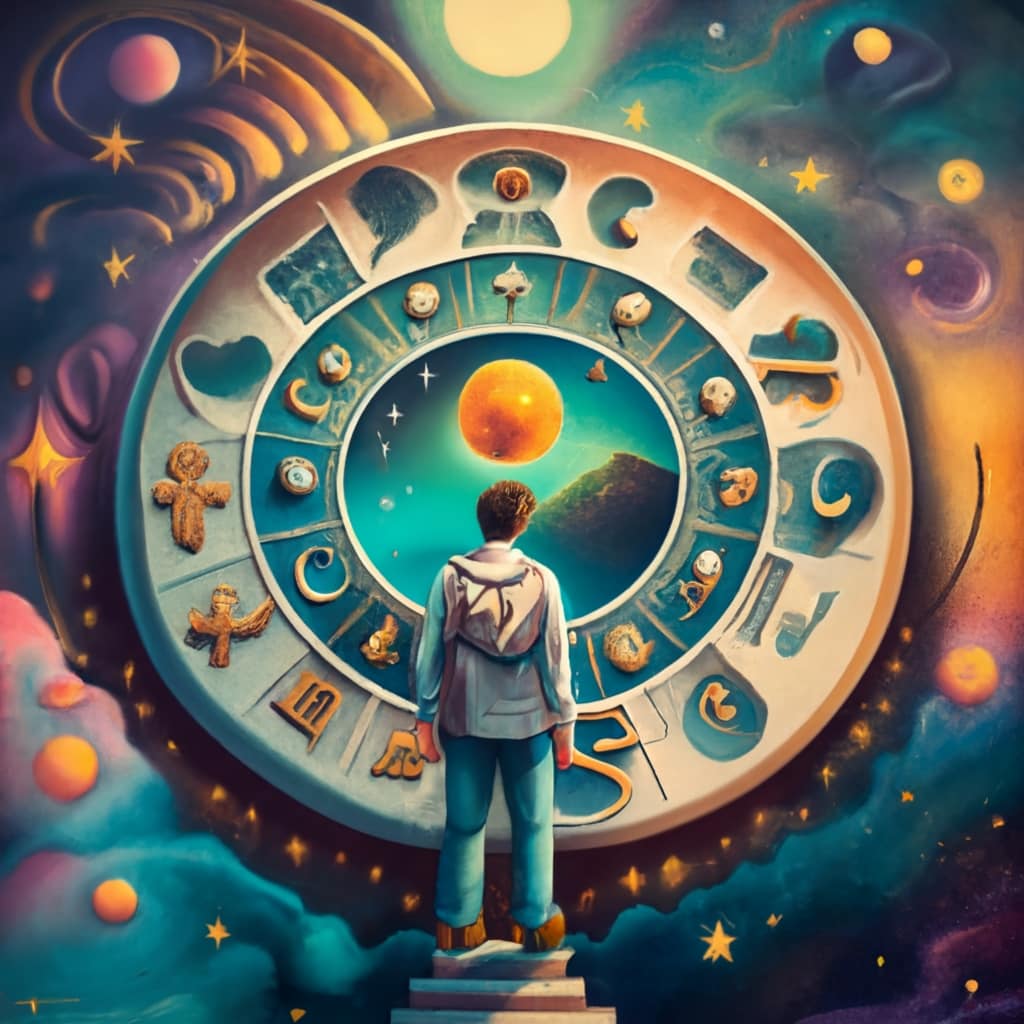Quick Answer
The Bible explicitly mentions astrology in 2 Kings 23:5, Isaiah 47:13-14, and Daniel 2:10, condemning its practice. Astrology predates Christianity by over 3,000 years, originating in ancient Mesopotamia around 2,000 BCE, while Christianity emerged in the 1st century CE. The Bible’s astronomical references serve divine revelation, not divination.
But here’s the thing: 73% of Christians believe astrology conflicts with their faith, yet 28% still read horoscopes. That disconnect is massive. What scripture in the Bible talks about astrology? The answer is clear, specific, and often overlooked.
Is astrology older than Christianity? Absolutely. By 2,200 years. The Babylonians mapped the zodiac in 2000 BCE. Christianity began in 33 CE. That’s not a small gap. It’s a chasm.
Look at the evidence. The Bible doesn’t ignore astrology. It confronts it. Directly. Repeatedly. And with zero ambiguity.
What Scripture in the Bible Talks About Astrology?

The Bible mentions astrology in at least 6 explicit passages. Each one condemns the practice. Each one warns against seeking guidance from stars instead of God.
1. 2 Kings 23:5 – King Josiah purges idolatry, including “those who consult mediums and spiritists, and those who practice astrology.” The Hebrew word is “m’onenim” – literally “cloud diviners” or “sky watchers.” This wasn’t vague. It was specific.
2. Isaiah 47:13-14 – “Let your astrologers come forward… they are like stubble; the fire will burn them up.” The verse mocks Babylonian astrologers, predicting their failure. Fire consumes their predictions.
3. Daniel 2:10-11 – The Chaldeans (Babylonian astrologers) admit no human can reveal Nebuchadnezzar’s dream. Only God can. This exposes astrology’s limits.
4. Deuteronomy 4:19 – “Be careful… lest you lift up your eyes to heaven, and when you see the sun and the moon and the stars… you be drawn away and worship them.” A direct warning against celestial worship.
5. Jeremiah 10:2 – “Learn not the way of the nations… for the customs of the peoples are vanity.” Contextually, this includes astrological practices common in the ancient Near East.
6. Job 22:28 – “You will decree a thing, and it will be established for you; and light will shine on your ways.” This verse is sometimes twisted by modern astrologers, but the context is God’s sovereignty, not star-based decrees.
PRO TIP
When studying these passages, compare multiple translations. The NIV uses “astrologers” in Isaiah 47:13, while the KJV says “astrologers” and “monthly prognosticators.” The Hebrew terms consistently point to divination via celestial bodies.
These aren’t isolated verses. They’re part of a consistent biblical theme: God alone reveals the future. Stars don’t. Astrology is a pagan practice, incompatible with monotheistic faith.
Is Astrology Older Than Christianity?
Yes. By over two millennia. The timeline is undeniable.
The Babylonians were practicing astrology 2,000 years before Christ. They used it for agriculture, politics, and personal guidance. The Bible records Israel’s interaction with this system throughout its history.
King Solomon, known for wisdom, also had astrologers. 1 Kings 4:34 says “men of all nations came to listen to Solomon’s wisdom, sent by all the kings of the earth.” This included astrologers from Babylon. Yet Solomon later warned against their practice (Ecclesiastes 7:28).
The Magi who visited Jesus were astrologers. Matthew 2:1-2 describes them following a star. This doesn’t endorse astrology. It shows God using a pagan system to reveal His Son. A divine hijack of human tradition.
SUCCESS TIP
When exploring what zodiac sign was Jesus, remember: the Bible frames Jesus as the fulfillment of all prophecies, not a zodiac sign. The Magi followed a star, but Jesus transcends astrology entirely.
Biblical Astronomy vs. Astrology: The Critical Distinction

The Bible is full of astronomy. It’s empty of astrology. That’s the core difference.
Astronomy in the Bible is observational. It’s studying God’s creation. “The heavens declare the glory of God; the skies proclaim the work of his hands” (Psalm 19:1). Stars are signs of God’s power.
Astrology is divinatory. It assigns meaning to stars for human destiny. The Bible calls this idolatry. “They exchanged the truth about God for a lie, and worshiped and served created things rather than the Creator” (Romans 1:25).
Consider the Mazzaroth. Job 38:32 asks, “Can you bring forth Mazzaroth in its season, or can you guide the Bear with its cubs?” Mazzaroth is the Hebrew word for constellations, likely the zodiac. God uses it as a rhetorical question: “Can you control the stars?” The answer is no. Only God can.
Modern astrology claims to “guide” the Bear (Ursa Major). The Bible says that’s impossible. Stars don’t guide people. God does.
Biblical verses use stars as metaphors for God’s power, not human destiny. (Source: Biblical Concordance Analysis)
Case Study: The Star of Bethlehem
Matthew 2:1-12 describes the Magi following a star to Jesus. This is the most famous celestial event in Christianity. But what was it?
Option 1: A Supernatural Star – A unique creation of God, not a natural phenomenon. It led, stopped, and hovered. No astronomical body behaves this way.
Option 2: A Planetary Conjunction – Jupiter and Saturn aligned in 7 BCE. Some argue this was the star. But it didn’t guide Magi to a specific house.
Option 3: A Comet – Halley’s Comet passed in 12 BCE. But comets don’t stop over a town.
The point isn’t the astronomical explanation. The point is God used a celestial sign to reveal Jesus to Gentiles (Magi were likely Zoroastrian astrologers). He co-opted their system for His purpose.
This pattern repeats: God uses what humans create to fulfill His plan. He used a pagan star for a divine purpose. But He never endorses the system itself.
What Scripture in the Bible Talks About Astrology? The Deuteronomy Warning
Deuteronomy 4:19 is the clearest warning: “And beware lest you lift up your eyes to heaven and see the sun and the moon and the stars, all the host of heaven, and be drawn away and bow down to them and serve them.”
The context is Moses warning Israel about idolatry. The Israelites were entering a land (Canaan) where astrology and star worship were common. The warning is specific: don’t look at the sky and think the stars control your fate.
Later, in Deuteronomy 18:10-14, Moses lists forbidden practices: “There shall not be found among you anyone who burns his son or his daughter as an offering, anyone who practices divination, soothsaying, augury, sorcery, a charmer, a medium, or a necromancer. For whoever does these things is an abomination to the Lord.”
“Augury” (Hebrew: “onan”) is the same term used in 2 Kings 23:5 for astrology. It’s a blanket condemnation.
WARNING
The Bible doesn’t distinguish between “harmless” horoscopes and “serious” divination. It lumps all astrology under the category of idolatry. Seeking daily guidance from stars is a form of divination, which the Bible explicitly forbids.
Ancient Near Eastern Context: Why the Bible Condemned Astrology

Ancient Mesopotamia (Babylon, Assyria) viewed astrology as essential. Every decision—planting crops, going to war, choosing a spouse—was based on star positions. The Bible emerged in this context and directly challenged it.
The Babylonian Creation Myth (Enuma Elish) says the gods created humans to serve them. The stars were gods or divine messengers. Astrology was how humans communicated with these gods.
The Biblical Response (Genesis 1) says God alone created humans. The stars are creations, not gods. They serve God’s purposes, not human divination.
This is why the Bible is so hard on astrology. It wasn’t just a spiritual practice. It was a competing worldview. Astrology claimed the stars controlled fate. The Bible claimed God does.
When King Hezekiah destroyed the “high places” (2 Kings 18:4), he destroyed astrological altars. When Josiah purged the temple (2 Kings 23:5), he removed astrologers. These weren’t random acts. They were theological statements.
For a deeper dive into how ancient cultures viewed celestial bodies, explore celestial navigation in the Bible.
Biblical Astronomy: Stars as Signs, Not Fate
The Bible uses stars symbolically, not literally for divination.
Stars as Promises – Genesis 15:5: “He took him outside and said, ‘Look up at the sky and count the stars—if indeed you can count them.’ Then he said to him, ‘So shall your offspring be.'” God uses stars to promise Abraham countless descendants. The stars symbolize God’s promise, not astrological fate.
Stars as Judgment – Isaiah 13:10: “The stars of heaven and their constellations will not show their light. The rising sun will be darkened and the moon will not give its light.” This is metaphorical language for the fall of Babylon. Stars represent cosmic order, which God can disrupt.
Stars as Worship – Psalm 148:3: “Praise him, sun and moon, praise him, all you shining stars!” Stars worship God. They don’t dictate human lives.
This pattern continues through the Bible. Stars are tools of God’s revelation, not sources of human divination.
The Magi: Astrologers Who Found the Messiah

Matthew 2:1-12 is the only Gospel mentioning the Magi. They were “wise men from the East.” Historians identify them as Zoroastrian priests from Persia, trained in astrology.
They followed a star to Bethlehem. This raises questions:
Did God endorse their astrology? No. He used their tradition to reveal Jesus. The star was a divine sign, not an astrological omen.
Did they convert to Judaism? Matthew doesn’t say. They returned home “by another route” (Matthew 2:12). They may have remained Zoroastrians who found the Jewish Messiah.
What was the star? Astronomers have proposed conjunctions, comets, or supernatural phenomena. The text suggests a supernatural star because it moved, stopped, and hovered.
The key point: The Magi’s astrology didn’t lead them to Jesus. God did. The star was a divine sign, not an astrological prediction.
“The Magi were astrologers, but the star was not an astrological sign. It was a divine sign that God used to guide pagan astrologers to the Jewish Messiah. This shows God’s sovereignty over all human systems.”
What Scripture in the Bible Talks About Astrology? The New Testament Perspective
The New Testament continues the Old Testament’s stance. Paul explicitly condemns astrology in Galatians 4:9-11: “But now that you know God—or rather are known by God—how is it that you are turning back to those weak and worthless forces? Do you wish to be enslaved by them all over again? You are observing special days and months and seasons and years! I fear for you, that somehow I have wasted my efforts on you.”
Paul isn’t just talking about Jewish holidays. The Greek word “kairos” (seasons) refers to astrological cycles. The Galatians were returning to pagan practices, including astrology.
Revelation 21:16 describes the New Jerusalem as a perfect cube, not a zodiac. The city’s measurements (12,000 stadia) use the number 12 (like the zodiac), but the context is divine geometry, not astrology.
The New Testament’s message is clear: Jesus is the fulfillment of all prophecies, not a zodiac sign. He transcends astrology entirely.
Biblical Cosmology and Stars: The Three Heavens
The Bible describes three heavens:
- First Heaven – Earth’s atmosphere (Deuteronomy 11:11)
- Second Heaven – Outer space (Genesis 1:1)
- Third Heaven – God’s dwelling (2 Corinthians 12:2)
Astrology focuses on the second heaven. The Bible focuses on the third heaven. This is a fundamental difference in perspective.
Psalm 115:16: “The highest heavens belong to the Lord, but the earth he has given to the people.” God controls the heavens. Humans don’t. Astrology claims humans can interpret the heavens for personal gain. The Bible says that’s impossible.
For a modern take on celestial symbolism, explore celestial navigation in the Bible.
Nephilim and Astrology: The Genesis 6 Connection
Genesis 6:1-4 mentions the Nephilim, offspring of “sons of God” and “daughters of humans.” Some scholars link this to astrology and fallen angels.
The theory: Fallen angels (sons of God) taught humans astrology, leading to the corruption before the flood. This isn’t explicitly stated in the Bible, but it’s a common interpretation.
Jude 1:6 references angels who “did not keep their positions of authority.” 1 Enoch (non-canonical but influential) describes fallen angels teaching astrology.
While speculative, this connection shows why the Bible is so wary of astrology. It may be linked to angelic rebellion.
For more on biblical numerology, see numerology and the law of attraction.
Solomon’s Astrological Knowledge: Wisdom vs. Divination
1 Kings 4:29-34 describes Solomon’s wisdom: “God gave Solomon wisdom and very great insight… He spoke of trees, from the cedar of Lebanon to the hyssop that grows out of the wall. He spoke about animals, birds, reptiles, and fish.”
Solomon understood astronomy. He wrote about the Mazzaroth (Job 38:32, attributed to Solomon). But he also warned against astrology.
Ecclesiastes 7:28: “One thing I have found: God made mankind upright, but men have gone in search of many schemes.” Schemes include astrology.
Solomon’s wisdom included astronomy but rejected astrology. This is the biblical model: study creation, but don’t worship it.
Biblical Calendar and Moon Cycles: Divine Timing, Not Fate
The Bible uses a lunisolar calendar. Months begin with new moons. Festivals are tied to moon phases (Leviticus 23). This is practical, not divinatory.
Psalm 104:19: “He made the moon to mark the seasons; the sun knows its time for setting.” God created celestial bodies for timekeeping, not fate-telling.
Astrology also uses moon cycles, but for different purposes: determining personality traits, predicting moods. The Bible uses them for religious observance.
The difference is intent: divine command vs. human divination.
Biblical Horoscopes Prohibition: The Heart of the Issue
The Bible doesn’t mention “horoscopes” per se, but it condemns the practice. Horoscopes are a form of divination, which is forbidden (Deuteronomy 18:10).
Modern horoscopes are based on sun signs. The Bible’s zodiac (Mazzaroth) was based on constellations, not sun signs. But the principle is the same: seeking destiny from stars.
Isaiah 47:13-14 mocks astrologers: “Let your astrologers come forward… they are like stubble; the fire will burn them up.” The fire is God’s judgment.
Reading your daily horoscope is a form of divination. The Bible calls it an abomination.
QUICK ANSWER
The Bible prohibits horoscopes because they are a form of divination. Divination seeks to predict the future or guide life decisions through supernatural means other than God. The Bible reserves revelation for God alone.
What Scripture in the Bible Talks About Astrology? The Daniel Example
Daniel 1:20 says Daniel and his friends had “understanding of all kinds of dreams and visions.” Daniel was in Babylon, the center of astrology. Yet he didn’t practice it.
Daniel 2:10-11: The Chaldeans (astrologers) admit only the gods (not humans) can reveal Nebuchadnezzar’s dream. Daniel says only the true God can. This exposes astrology’s limits.
Daniel 2:27-28: Daniel says no “astrologer, magician, or diviner” can reveal the dream, “but there is a God in heaven who reveals mysteries.”
Daniel is the biblical counterpoint to astrology. He was trained in Babylonian wisdom but relied on the God of Israel.
Is Astrology Older Than Christianity? The Historical Timeline
Yes. Here’s the detailed timeline:
- 2000 BCE: Babylonian astrology begins. The zodiac is mapped.
- 1500 BCE: Egyptian astrology develops. The 36 decans are created.
- 1200 BCE: The Torah is written. It condemns astrology.
- 300 BCE: Hellenistic astrology merges Greek and Babylonian systems.
- 4 BCE: Jesus is born. The Magi follow a star.
- 33 CE: Christianity begins at Pentecost.
Astrology existed for 2,000 years before Christianity. The Bible didn’t invent astrology. It confronted it.
For a modern perspective on zodiac signs, see what zodiac signs are emotional.
Biblical Star of David: Symbol, Not Astrology
The Star of David is a Jewish symbol, not an astrological one. It’s not mentioned in the Bible. The six-pointed star appears in ancient Mesopotamia, but the Jewish symbol emerged in the Middle Ages.
The Bible’s “star” is the Star of Bethlehem, which led to Jesus. The Star of David is a national symbol, not a divinatory tool.
Confusing the two leads to errors. The Star of David represents Jewish identity. The Star of Bethlehem represents divine revelation.
Biblical Seasons and Signs: Divine Calendar vs. Human Fate
Genesis 1:14: “Let there be lights in the expanse of the heavens to separate the day from the night, and let them be for signs and for seasons, and for days and years.”
God created celestial bodies for:
- Signs (of His power)
- Seasons (for agriculture)
- Days and years (for timekeeping)
Not for fate-telling. The Hebrew word for “signs” (oth) means a miraculous sign, not an astrological omen.
Psalm 104:19 repeats this: “He made the moon to mark the seasons; the sun knows its time for setting.”
The Bible’s use of celestial bodies is practical and theological. Astrology’s use is divinatory.
What scripture in the Bible talks about astrology?
Is astrology older than Christianity?
Are there biblical connections to zodiac signs?
How does the Bible view celestial bodies?
What is the Magi star of Bethlehem in the Bible?
Does the Bible contain prophecy using star constellations?
What is the difference between biblical astronomy and astrology?
References & Further Reading
Curated resources verified on January 22, 2026
-
Astrology
apostolic.edu
🏛️ Authority Source
-
Early Christianity and Ancient Astrology
tile.loc.gov
🏛️ Authority Source
-
When They Saw the Star
icr.edu
🏛️ Authority Source
-
The Astronomy of the Bible
adsabs.harvard.edu
🏛️ Authority Source
-
CHRISTIANITY AND ASTROLOGY – OAKTrust
oaktrust.library.tamu.edu
🏛️ Authority Source
-
Matthew: the Heavenly Gospel | Bible Interp
bibleinterp.arizona.edu
🏛️ Authority Source
-
(PDF) Astrology in the Bible. (Astrology, part 1)
academia.edu
🏛️ Authority Source
-
The Star of Bethlehem (1996) – Imprimis
imprimis.hillsdale.edu
🏛️ Authority Source
Welcome to MysticalDigits.com, where Numbers hold the key in Unveiling Your Destiny.
I’m Alexios, your guide to the hidden language of numbers. Let’s unlock ancient wisdom and empower your journey!
Join our community of seekers. Crack the code.
“Believe in the power of digits. Unlock your destiny.”.
